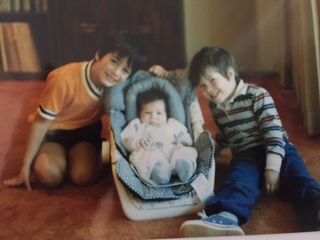Relationships
Old Photos
Old photos bring back time and place--joy and sorrow all at once.
Posted July 16, 2017
In cleaning out a closet, I find a shoebox filled with old photos that my brother Steve and I retrieved from my parents’ house after my mother died. My mother’s death in early 2009 forced us to begin the painful process of dismantling the physical elements of our earlier lives together; and that meant mementos, which included, of course, old photos. Most of these pictures were those we had given to our parents long ago, so my brother and I split them up; he took the photos of his children and grandchildren and I took my own.
However, upon opening the top of the box, I immediately abandoned my organizing mission. Instead, I sat on the floor in front of the closet, examining these paper treasures from earlier times.
I see my father, aging yet still robust in his health. With his trademark broad, jovial smile, he looks impishly toward the lens as he stands by his beloved white Corolla. His ruddy cheeks, strong arms, and huge, jolly smile remind me of the countless times he would envelop me with his love and attentiveness. I immediately predict the photo’s date, 1994, the last year he would experience a full and active life. By the next year, he would substitute permanently his golf clubs and car for a four-pronged cane and a wheelchair, his health forever changed by a debilitating stroke. At age 72, he would become wheelchair-bound, and only able to speak minimally. Next, the out-of-order pictures piled into a shoebox reveal my father a year later, so soon after his stroke that he still has his arm brace and a drooping mouth attempting to smile. The juxtaposition of these two photos, which had been haphazardly dumped into the box, take my breath away. It’s not a new realization that I had two fathers: the one who once nurtured everyone and the one who then needed everyone to nurture him as he required around-the-clock care.
Another snapshot focuses on yesteryear—one of my three adorable little boys. The oldest, Michael, is five-and-a-half, Adam is three, and Brian is one-month old. The older boys each rest their twig-like arms on Brian’s infant seat, which is between them on the floor. The proud big brothers smile playfully, betraying their mischievousness and, at the same time, their soon-to-be conscious realization that their lives have changed yet again. They sit still for the photo, but afterward only seconds will tick by before they will run through the house with unbridled energy.

These photos represent a simpler, easier life; yet, at the time, back when I was living it every day, I would not have agreed with that sentiment. In one photo, my parents are very much alive and vibrant; in another, as a young mother, my own journey appears long and full without knowledge of heartache and loss; in another candid, portrait-like shot, I am still young enough to have the generation above me to worry about my wellbeing; and, in another treasured snapshot, I have those in the generation below me, my children, to protect and to love.
Another photo shows our first dog, Teddy, curled up in his black-and-white-patterned bed. His clear eyes and shiny coat remind me that he is a recent addition to our family in 1992. We have no way of knowing we would be blessed with him for fourteen more glorious years. When Teddy finally leaves, Brian and Adam will be in college and Michael in graduate school. This photo seems like one from a lifetime ago, one of cherished moments through the viewfinder of our furry fourth son.
In another photo, I see four generations. My grandmother, Nana Bea; her daughter (my mother); my son, Michael, at three months old; and me, a newly-minted mother. We are together for Michael’s first visit to San Francisco. My mother seems old, but she is only 57, just six years younger than I am now. No one could know then that my grandmother would be with us for only four more years, just long enough to meet our second son, Adam. As a new mother, the photo shows the novelty I felt of bringing new life to my parents as well as the relief of a post-pregnancy reality (despite the photo also reflecting an exhausted, overweight 26-year-old with a horrible perm). We are all smiling at the joy of a new baby in the family. Our dresses imply that we are waiting for a babysitter so we can have an adult evening—one that requires reservations and delicious food choices that I do not have to prepare; a night out where my parents can dote over me, and one where I can be a young woman instead of just a young mother. I also see the anticipation of relief in my eyes, knowing that for a few hours I will be free from bottles and listening for cries.
Another photo is buried deeper in the shoebox, but I’m able to pull it out by its glossy colors and examine it. With his Transformer lunchbox, five-year-old Michael stands against our beige, kitchen wall. It is his first day of kindergarten. He doesn’t eat lunch at school, but he still wants the symbolic big-boy lunchbox, so he has chosen his favorite themed toy. His stance indicates one of pride and reticence, but also belies his nervousness of going to his first day of school and leaving us behind.
My heart is heavy in a way that I cannot totally articulate. I want to see more photos, yet I close the box and immediately place it on the shelf in the back of the closet almost out of reach, more so as an act of protection than one of order.
The initial excitement I felt in viewing the miscellaneous and colorfully frozen moments has now been replaced by an extraordinary melancholy. It is the painful joy of loss and remembrance, of what once was and can never be again, a gift that, once opened, can never again be wrapped.
I acknowledge both my good fortune and my anguish as I wipe away tears before closing the closet door.


